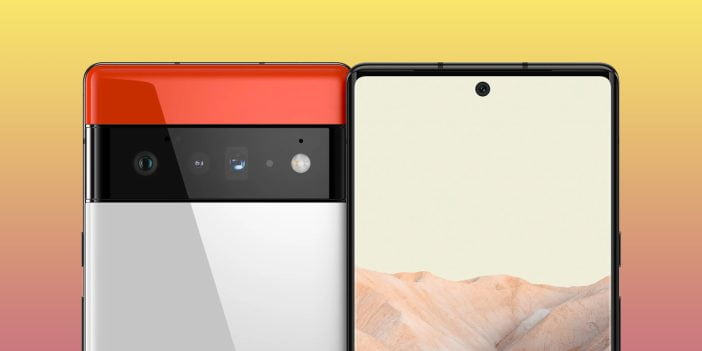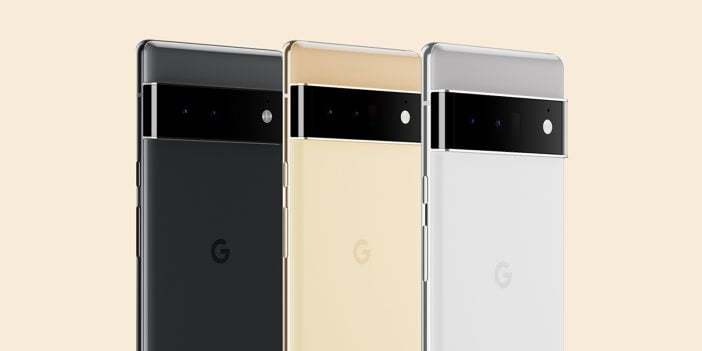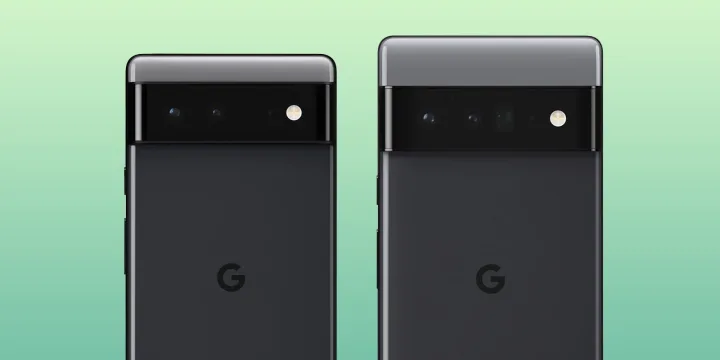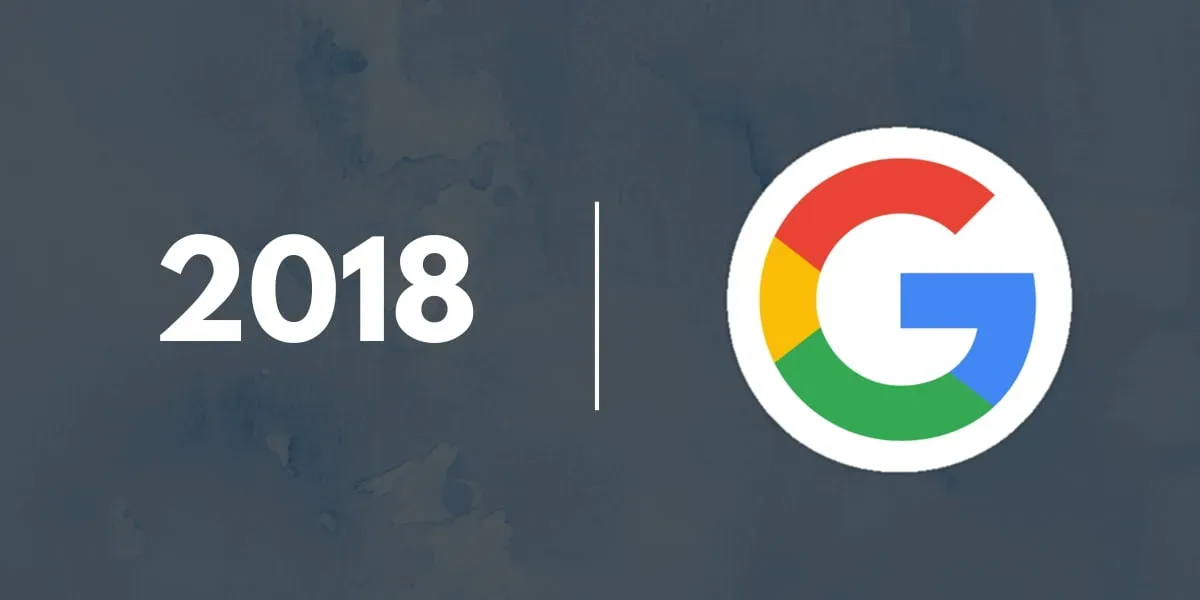Google has been teasing Pixel 6 and Pixel 6 Pro for a long time. So it wouldn’t be unfair if you say that it’s the most anticipated phone of 2021. Since their last phone, Pixel 5, which was more of a downgrade, Pixel and stock Android fans were rooting for a phone with competitive specs.
The company has finally unveiled its long-awaited Pixel 6 and Pixel 6 Pro flagship smartphones. Both are powered by Google’s latest in-house SoC, Google Tensor. In addition, the flagship phones are also running the newest Android 12 update, along with major improvements in the camera department and performance. First, let’s take a look at Pixel 6 and Pixel 6 Pro.
Design & display:

Nowadays, almost all smartphones look the same, especially Android phones. Once something gets trending in the industry, everyone seems to follow for a long time. This has made smartphones dull. Apple seems to be the only company that doesn’t follow the trend but adds more to the phone culture.
With this year’s flagship phones, Google has determined to do the same with the Pixel series. However, it’s not the first time that the company has gone against the odds and designed a weird-looking phone, but this year’s Pixel phones are good in many ways. Both phones take design cues from Nexus 6P’s camera bar, which was also the LAST Nexus phone ever.
Pixel 6 has a smaller 6.4” display but with a flat-screen and visible bezels around the design; however, Pixel 6 Pro has an LTPO display with a 6.7” screen size and a slightly curved display around the edges. Furthermore, Pixel 6 comprises a Tactile alloy frame, while the Pro variant has a polished alloy frame. In addition, both phones have scratch-resistant Corning Gorilla Glass Victus on the front; however, only the back of the pro variant is of Gorilla Glass Victus.
This year, Google is also going for an in-display fingerprint scanner for both phones, as it seems that the experiment with Pixel 4’s face-scanning radar technology is no longer a thing. In addition, both phones are also IP68 dust and water-resistant.
Cameras
The smaller Pixel 6 has a dual-camera system on the back; however, the larger Pixel 6 Pro comes with a triple rear camera setup. The regular Pixel 6 comes with a 50 MP primary sensor and a 12 MP ultrawide camera, along with an 8 MP front camera. The Pro variant has a primary 50 MP wide sensor, a 12 MP ultrawide, and a 48 MP telephoto lens, along with an 11.1 MP front camera. In addition, Both phones have an LDAF sensor as well. Both phones have a similar 50 MP Octa PD Quad Bayer wide camera sensor.
Storage/Memory
Just like other companies, there’s a spec jump in storage and memory of Pixel phones this year. The smaller Pixel 6 now has 8GB of LPDDR5 RAM and a base storage of 128GB, and a maximum storage capacity of 256GB. While the higher-end Pro variant has 12GB of RAM along with 512GB max storage.
Performance:
Google’s in-house Tensor chip has been in rumors for some time. Just like Apple, which uses an in-house designed chipset for its iPhone, iPads, and Macs, the search giant now has its own SoC for Pixel phones. According to Google, Pixel phones with Tensor chips perform 80% faster than last year’s Pixel 5. This is a very lousy comparison since the Pixel 5 has a mid-range chipset from Qualcomm. It would be interesting to see Google’s Tensor chipset’s comparison with Apple’s A-series chipset for iPhone or even M1 chip used in the latest iPads and Macs.
In addition, the security of these phones has increased, thanks to the new Titan M2 coprocessor used in both phones. Google also announced that these Pixel phones would be getting security updates for up to 5 years, which is promising. Google also promises to
Battery performance has also been improved. The regular Pixel 6 has a 4,614 mAh battery; however, the Pixel 6 Pro has a larger 5,003 mAh battery. In addition, both phones support fast wireless charging. With Google’s Tensor chip, users might see significant improvement in battery performance.
Pricing/Colors:
Pixel 6 starts from $599, which is less than their previous phones. While the higher-end Pixel 6 Pro has a price tag of $899. Pixel 6 and Pixel 6 Pro are available in three different colors. Stormy Black is a common color between two phones; however, Pixel 6 is available in Kinda Coral and Sorta Seafoam, while Pixel 6 Pro is available in Sorta Sunny and Cloudy White colors.
Availability
The phones are available to pre-order and will arrive in early November. However, some users are able to secure an early November schedule for delivery; however, some are reporting dates of 2022 for their order which might be a deal-breaker for many.
The new Pixel phones are launching with Android 12 on board. It’s one of the most significant redesigns in Android OS’ history. Google promises five years of updates, including security updates for Pixel 6 and Pixel 6 Pro, which is promising. Here’s a quick spec table for Pixel 6 and Pixel 6 Pro, respectively:
Pixel 6 specs:

- 6.4″ FHD+ display up to 90 Hz
- Dual rear camera system
- 50 MP wide, 12 MP ultrawide, LDAF sensor, 8 MP front camera
- Tactile alloy frame
- Corning Gorilla Glass Victus (front only)
- In-display fingerprint unlock
- Google Tensor chip
- Titan M2 coprocessor
- 8GB RAM / 128GB / 256GB
- 4614 mAh battery
- Wireless Fast Charging
- Stormy Black, Kinda Coral, Sorta Seafoam
- From $599
Pixel 6 Pro specs:

- 6.7″ QHD+ LTPO display up to 120 Hz
- Triple rear camera system
- 50 MP wide, 12 MP ultrawide, 48 MP telephoto, LDAF sensor, 11.1 MP front camera
- Polished alloy frame
- Corning Gorilla Glass Victus (front and back)
- In-display fingerprint unlock
- Google Tensor chip
- Titan M2 coprocessor
- 12 GB RAM / 128GB / 256GB / 512GB
- 5003 mAh battery
- Wireless Fast Charging
- Stormy Black, Sorta Sunny, Cloudy White
- From $899




Share Your Thoughts